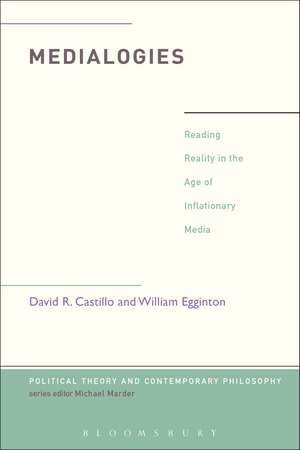Medialogies: Reading Reality in the Age of Inflationary Media: Political Theory and Contemporary Philosophy
Autor David R. Castillo, William Eggintonen Limba Engleză Paperback – 16 noi 2016
| Toate formatele și edițiile | Preț | Express |
|---|---|---|
| Paperback (1) | 192.73 lei 3-5 săpt. | |
| Bloomsbury Publishing – 16 noi 2016 | 192.73 lei 3-5 săpt. | |
| Hardback (1) | 832.65 lei 6-8 săpt. | |
| Bloomsbury Publishing – 16 noi 2016 | 832.65 lei 6-8 săpt. |
Din seria Political Theory and Contemporary Philosophy
- 23%
 Preț: 191.13 lei
Preț: 191.13 lei - 30%
 Preț: 540.80 lei
Preț: 540.80 lei - 13%
 Preț: 239.59 lei
Preț: 239.59 lei -
 Preț: 190.96 lei
Preț: 190.96 lei - 13%
 Preț: 237.75 lei
Preț: 237.75 lei - 13%
 Preț: 257.50 lei
Preț: 257.50 lei - 22%
 Preț: 256.29 lei
Preț: 256.29 lei - 22%
 Preț: 258.77 lei
Preț: 258.77 lei - 30%
 Preț: 774.20 lei
Preț: 774.20 lei - 23%
 Preț: 178.36 lei
Preț: 178.36 lei -
 Preț: 239.59 lei
Preț: 239.59 lei - 14%
 Preț: 191.13 lei
Preț: 191.13 lei - 13%
 Preț: 257.41 lei
Preț: 257.41 lei - 22%
 Preț: 225.12 lei
Preț: 225.12 lei - 23%
 Preț: 222.84 lei
Preț: 222.84 lei - 21%
 Preț: 217.62 lei
Preț: 217.62 lei - 24%
 Preț: 188.01 lei
Preț: 188.01 lei - 30%
 Preț: 510.34 lei
Preț: 510.34 lei - 30%
 Preț: 511.81 lei
Preț: 511.81 lei
Preț: 192.73 lei
Preț vechi: 223.41 lei
-14% Nou
Puncte Express: 289
Preț estimativ în valută:
36.88€ • 40.05$ • 30.98£
36.88€ • 40.05$ • 30.98£
Carte disponibilă
Livrare economică 01-15 aprilie
Preluare comenzi: 021 569.72.76
Specificații
ISBN-13: 9781628923599
ISBN-10: 1628923598
Pagini: 288
Dimensiuni: 152 x 229 x 24 mm
Greutate: 0.41 kg
Editura: Bloomsbury Publishing
Colecția Bloomsbury Academic
Seria Political Theory and Contemporary Philosophy
Locul publicării:New York, United States
ISBN-10: 1628923598
Pagini: 288
Dimensiuni: 152 x 229 x 24 mm
Greutate: 0.41 kg
Editura: Bloomsbury Publishing
Colecția Bloomsbury Academic
Seria Political Theory and Contemporary Philosophy
Locul publicării:New York, United States
Caracteristici
Uses philosophy, theory, novels, films, and mass media to analyze and explore our notion of how reality is constructed
Notă biografică
David R. Castillo is Professor in the Department of Romance Languages and Literatures at the State University of New York at Buffalo, USA.William Egginton is Andrew W. Mellon Professor in the Humanities at Johns Hopkins University, USA.
Cuprins
AcknowledgmentsIntroduction: MedialogiesPart I: Inflationary Media1. Editing Reality2. A New Perspective 3. Theatricality 4. Commodity-Spectacles 5. How to Turn Things into Copies, and Copies into Things Part II: Fundamentals 6. Ineffable Me7. Foundations8. Freedom for Sale9. Crime Shows10. Political Theater11. Monumental Screens 12. The New Fundamentals Part III: Exclusions 13. Terrifying Vistas of Reality14. Dreamboat Vampires and Zombie Capitalists15. The Global Undead16. Dark Mirrors17. Apocalypse Then and Now Part IV: In Defense of Being 18. Minor Strategies19. Stranger Than Fiction20. Truth and Lies in Life and Art21. Staging the Event 22. The Architecture of Mourning23. Occupy and Resist24. New Empires Epilogue
Recenzii
Following the views of postmodern theorists that the media now represent a hyperreal world, one that is constructed/configured by media impressions of reality, the authors see the media as arbiters and editors of a world presented as a commodity to a public. They wed such perspectives to the growth of modernism, individualism, science's power to render things objectively, and the agency of artists to render the world subjectively . Extending into today's politics, politicians like Trump copy images of America's past to apply to America's future. Media participate in acts of transformative reality, a series of codes parsing the world for personal consumption, making the real world I-world.
Every epoch demands, expresses, and is determined by a book. Most of the time these texts are noticed years after the fact, as it takes generations of scholars and readers to acknowledge the extent to which they capture that epoch. But Medialogies, like Deleuze and Guattari's A Thousand Plateaus or Hardt and Negri's Empire, will have an immediate impact. The argument that humanities are not a luxury is in itself not new; but this book shows that they have become vital to our very survival as a species precisely because of how media frame, politically and culturally, our conception of reality. If Castillo and Egginton manage to express these theses with examples from TV series like True Blood, political events like the Occupy movement, or such writers as Borges, it is not only because they are brilliant academics, but most of all because they are true intellectuals, something that has become rare in the 21st century.
This volume pushes the boundaries of scholarship across an impressive subject range. Castillo and Egginton have constructed an adventurous set of ideas that provide challenging new insights into the ways the various media plays a key role in the formation of our contemporary reality.
Every epoch demands, expresses, and is determined by a book. Most of the time these texts are noticed years after the fact, as it takes generations of scholars and readers to acknowledge the extent to which they capture that epoch. But Medialogies, like Deleuze and Guattari's A Thousand Plateaus or Hardt and Negri's Empire, will have an immediate impact. The argument that humanities are not a luxury is in itself not new; but this book shows that they have become vital to our very survival as a species precisely because of how media frame, politically and culturally, our conception of reality. If Castillo and Egginton manage to express these theses with examples from TV series like True Blood, political events like the Occupy movement, or such writers as Borges, it is not only because they are brilliant academics, but most of all because they are true intellectuals, something that has become rare in the 21st century.
This volume pushes the boundaries of scholarship across an impressive subject range. Castillo and Egginton have constructed an adventurous set of ideas that provide challenging new insights into the ways the various media plays a key role in the formation of our contemporary reality.











